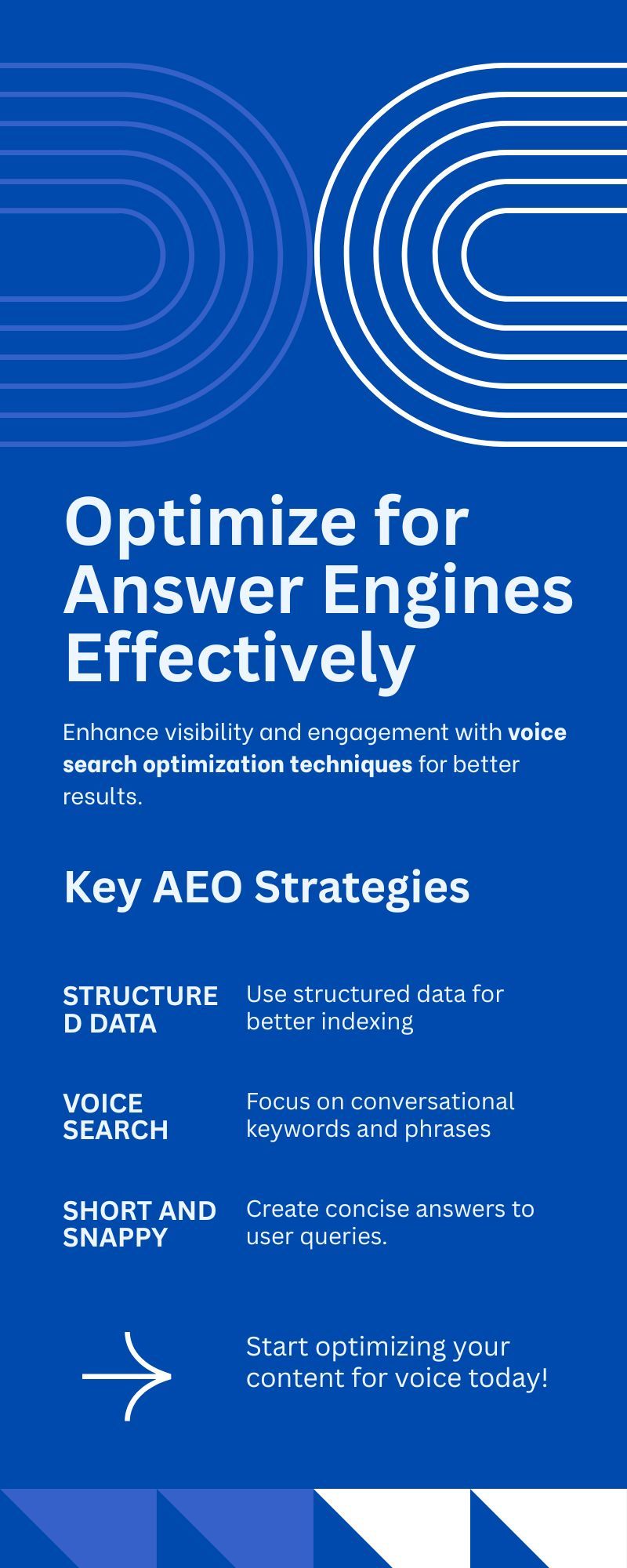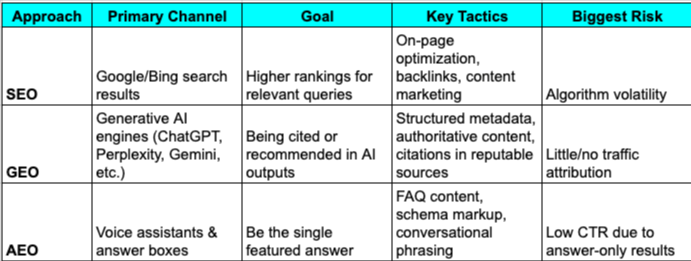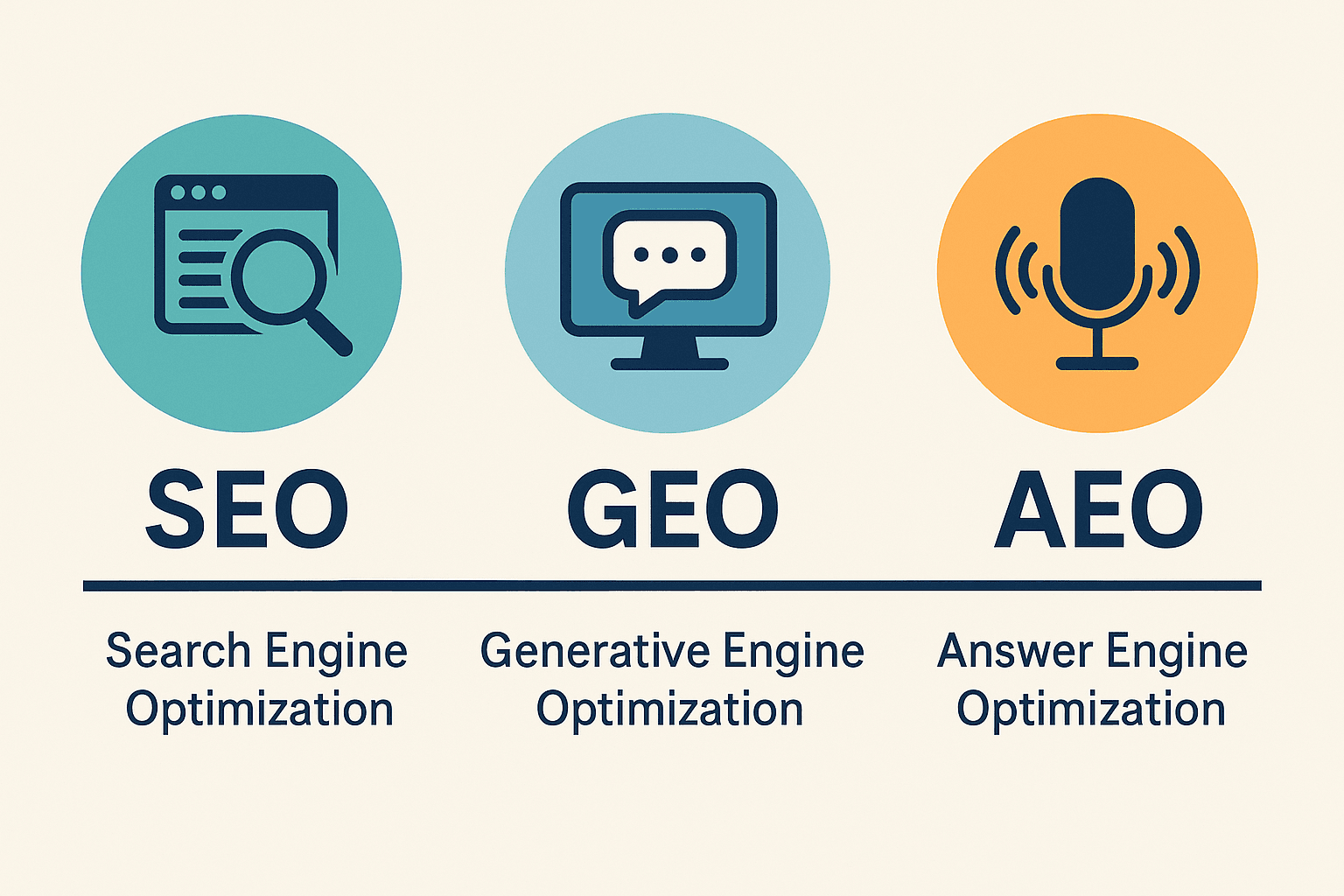Search has always been about visibility—how people discover your content, products, or brand online. For years, SEO (Search Engine Optimization) has been the dominant practice. But the rapid rise of artificial intelligence and voice assistants has created two new frontiers: GEO (Generative Engine Optimization) and AEO (Answer Engine Optimization).
Each approach tackles visibility from a different angle. Together, they illustrate how the future of search is fragmenting—and why marketers need to rethink how they create and distribute content.
What Is SEO?
Search Engine Optimization (SEO) is the practice of improving a website’s visibility in traditional search engines like Google or Bing. It relies on optimizing site structure, content, and authority signals so search algorithms rank your pages higher.
Advantages of SEO:
- Proven & Established: SEO has decades of best practices, tools, and case studies behind it.
- Scalable Traffic: A strong SEO program can bring in consistent, compounding traffic.
- User Intent Alignment: Search queries reveal specific intent—informational, transactional, navigational—making SEO powerful for conversions.
Disadvantages of SEO:
- Slow Ramp-Up: Results take months to materialize, unlike paid channels.
- Intense Competition: High-value keywords are saturated.
- Search Engine Dependence: Algorithm changes can erase gains overnight.
SEO remains critical, but search engines are no longer the only gateways to discovery.
What Is GEO?
Generative Engine Optimization (GEO) is the emerging practice of optimizing content so AI-powered tools like ChatGPT, Perplexity, or Google’s AI Overviews cite or surface your brand. Instead of climbing Google’s “blue links,” the goal is to be mentioned—or directly recommended—inside AI-generated answers.
Advantages of GEO:
- Future-Oriented: As generative AI adoption grows, GEO ensures your content doesn’t get bypassed.
- Content Citations: Being sourced in AI answers positions your brand as an authority.
- Early Mover Advantage: Few companies are formally practicing GEO, leaving room for differentiation.
Disadvantages of GEO:
- Lack of Standards: GEO is still experimental; guidelines and best practices are fuzzy.
- Opaque Engines: It’s often unclear why an LLM cites one source over another.
- Limited Attribution: Even if your site is cited, traffic may not follow—users might never click through.
Generative engines may shift traffic patterns fundamentally: the value may lie more in brand awareness than in raw visits.
What Is AEO?
Answer Engine Optimization (AEO) focuses on optimizing for voice assistants and direct answer boxes—think Siri, Alexa, or Google’s featured snippets. Instead of ranking across multiple links, the goal is to be the single, concise answer an assistant delivers.

Advantages of AEO:
- First-Mover Visibility: Being the chosen answer can deliver huge brand exposure.
- Voice Search Readiness: Optimizes for growing voice-based search behavior.
- Conversion Potential: AEO content often captures intent-rich, question-based queries.
Disadvantages of AEO:
- Winner-Takes-All: Only one answer typically gets surfaced, unlike SEO where multiple results can compete.
- Low Click-Through: Users may get their answer directly from the assistant, never visiting your site.
- High Technical Needs: Structured data, schema, and natural language optimization are required.
AEO is less about traffic volume and more about credibility and mindshare in answer-driven environments.

How They Work Together
The future isn’t about choosing between SEO, GEO, or AEO—it’s about blending all three:
- SEO ensures you’re visible in traditional search results and builds authority signals.
- AEO helps capture high-intent, question-based traffic and voice queries.
- GEO positions your brand for the next wave of AI-driven discovery.
Think of them as layers: SEO is the foundation, AEO ensures adaptability to voice and direct answers, and GEO future-proofs your content in an AI-first world.
Final Thoughts
For marketers, the challenge is clear: traditional SEO still matters, but the search landscape is shifting under our feet. Generative AI and voice assistants are changing how people ask questions and consume answers.
Brands that only optimize for Google risk being invisible in these emerging ecosystems. By integrating SEO, GEO, and AEO strategies, you can stay discoverable no matter how search evolves—whether a user types, speaks, or prompts their way to an answer.



